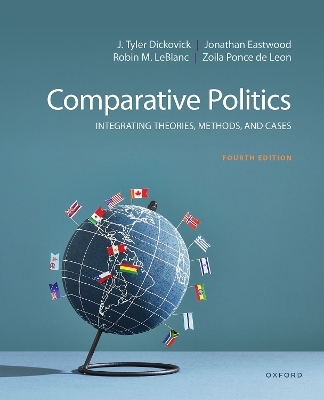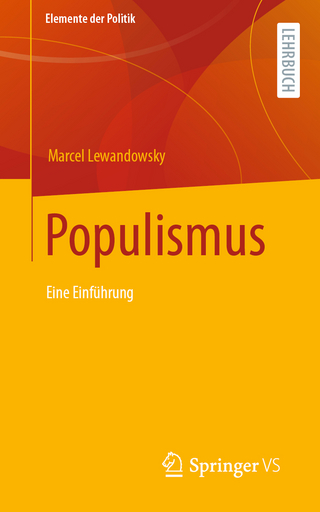
Comparative Politics
Oxford University Press Inc (Verlag)
978-0-19-763330-4 (ISBN)
J. Tyler Dickovick was the Grigsby Term Professor of Politics at Washington and Lee University. Jonathan Eastwood is a Professor of Sociology at Washington and Lee University. Robin LeBlanc is a Professor of Politics at Washington and Lee University and teaches classes on global politics, gender and politics, political philosophy, urban community, and protest. Zoila Ponce de Leon is an Assistant Professor of Politics and a core faculty member of the Latin American and Caribean Studies Program at Washington and Lee University.
Brief Contents
PART I: Comparative Political Analysis
1 The Comparative Approach: An Introduction
2 Theories, Hypotheses, and Evidence
PART II: The State, Development, -Democracy, and Authoritarianism
3 The State
4 Political Economy
5 Development
6 Democracy and Democratization
7 Authoritarian Regimes and Democratic Breakdown
PART III: Institutions of Government
8 Constitutions and Constitutional Design
9 Legislatures and Legislative Elections
10 Executives
11 Political Parties, Party Systems, and Interest Groups
PART IV: Politics, Society, and Culture
12 Revolutions and Contention
13 Nationalism and National Identity
14 Race, Ethnicity, and Gender
15 Ideology and Religion in Modern Politics
PART V: The Comparative-International Nexus
16 Comparative Politics and International Relations
PART VI: Country Profiles and Cases
Brazil
China
France
Germany
India
Indonesia
Iran (Islamic Republic of Iran)
Japan
Mexico
Nigeria
Russia (Russian Federation)
South Africa
United Kingdom
United States
Contents
Insights xv
Preface xvii
Maps of the World xxx
PART I: Comparative Political Analysis
Chapter 1
The Comparative Approach: An -Introduction
Asking Why: Research Questions in Comparative Politics
Major Questions in Comparative Politics
Empirical Arguments Versus Normative Arguments
Solving Intellectual Puzzles: A Contemporary Analogy
Concepts
Features of Good Concepts
Conceptualization
Operationalizing: From Concepts to Measures
Empirical Evidence
Facts and Evidence
Cases and Case Studies
The Comparative Method
Variables and Comparison
Most-Similar-Systems Design
Most-Different-Systems Design
Comparative Checking
Within-Case Comparison
Is the Study of Politics a Science? The Limits of the -Comparative Method
Chapter 2
Theories, Hypotheses, and Evidence
Introduction to Theories, Hypotheses, and Evidence
Theories
Hypotheses
How Theories Emerge and Are Used
Types of Evidence
Hypothesis Testing
Correlation
Causation
Critiques: Using Theories and Evidence
Empirical Critiques: Using Deviant Cases
Theoretical Critiques: Improving Theories and Hypotheses
The Challenges of Measurement: Biases, Errors, and Validity
THINKING COMPARATIVELY Qualities of Good Analysis and Argumentation
Step 1: Asking Good Questions: Why?
Step 2: Hypothesis Testing: Generating Good Hypotheses and Testing Them Fairly
Step 3: Balancing Argumentation: Evidence, Originality, and Meaningfulness
PART II: The State, Development, -Democracy, and Authoritarianism
Chapter 3
The State
Concepts
The Modern State
State Capacity
Fragile States
The State-Society Relationship
Types
Characteristics of Modern States
Bureaucracy
Impersonality
Sovereignty
Traditional Functions of States
Defense
Policing
Taxation
Order, Administration, and Legibility
Causes and Effects: Why Did States Emerge and -Expand?
Political or Conflict Theories
Economic Theories
Cultural Theories
Diffusion Theories
THINKING COMPARATIVELY Great Britain, the United -Kingdom, or Neither? State and Nation in England and Scotland
CASES IN CONTEXT
Mexico
France
United Kingdom
Nigeria
Chapter 4
Political Economy
Concepts
Inequality
Employment and Inflation
Types
Markets and States in Modern Economies
Markets and Economic Performance
States and Economic Performance
Economic Functions of Modern States
States and Economic Management
Investments in Human Capital: Education and Health
Infrastructure and Other Public Goods
Welfare State Functions
Causes and Effects: Why Do Welfare States Emerge?
Cultural Changes
Industrial Capitalism
Mobilization and Political Action
International Learning Effects
THINKING COMPARATIVELY Welfare States in the Nordic Countries: What Can We Learn and How?
CASES IN CONTEXT
United States
United Kingdom
Japan
Germany
Chapter 5
Development
Concepts
Types
Poverty
Social Outcomes and Human Development
Migration and Development
Gender Relations and Racial and Ethnic Identities
Satisfaction and Happiness
Cultural Development
Sustainability
Causes and Effects: Why Does Development Happen?
Institutions: The Market-State Debate, Revisited
Institutions: Beyond the Market-State Debate
Culture and Development
Civil Society, Social Capital, and Trust
Religion
Value Systems
Systems and Structures: Domestic and International
Domestic Economic Structures and Class Interests
International Economic Structures and Class Interests
Geography
THINKING COMPARATIVELY Explaining the Development of North and South Korea
CASES IN CONTEXT
India
Nigeria
China
Brazil
Chapter 6
Democracy and Democratization
Concepts
Democracy and Democratic Regimes
Procedural (Minimal) Definitions of Democracy
Substantive Definitions of Democracy
Regime Change and Democratization
Types
Types of Democracy
Representative Democracy
Direct Democracy
Types of Democratization
Democratic Transitions
Democratic Consolidation
Causes and Effects: What Causes Democratization?
Modernization
Culture and Democracy
The International System
Domestic Institutions
Agents and Actors: The Role of Individuals and Groups
Combining Arguments and Theories: Multiple Causes
THINKING COMPARATIVELY Is American Democracy a Model?
CASES IN CONTEXT
Brazil
China
India
United States
Chapter 7
Authoritarian Regimes and Democratic Breakdown
Concepts
Authoritarianism and Authoritarian Regimes
Transitions to Authoritarian Regimes
Types
Types of Authoritarianism
Totalitarian Regimes
Theocracies
Personalistic Dictatorships
Bureaucratic-Authoritarian Regimes
Hybrid and Semi-authoritarian Regimes
Types of Transition (or Nontransition) to Authoritarianism
Authoritarian Persistence
Democratic Breakdown
Transition to Hybrid or Semi-authoritarian Regime
Causes and Effects: What Causes Authoritarian Regimes to Emerge and Persist?
Historical Institutionalist Theories
Poverty and Inequality
State Weakness and Failure
Political Culture Theories of Authoritarian Persistence
Barriers to Collective Action
Special Causal Circumstances Surrounding Hybrid and -Semi-authoritarian Regimes
THINKING COMPARATIVELY Why Did Zimbabwe Become and Remain Authoritarian?
CASES IN CONTEXT
Iran
Russia
Mexico
Germany
France
PART III: Institutions of Government
Chapter 8
Constitutions and Constitutional -Design
Concepts
Constitutions
Constitutional Design
Types
Flexible and Rigid Constitutions
Separation of Powers: Judicial Review and Parliamentary -Sovereignty
Federalism and Unitarism
Federalism
Unitarism
Authoritarian and Democratic Constitutions
Causes and Effects: What Are the Effects of Federal and Unitary Constitutions?
What Constitutional Designs Support Social Stability?
What Constitutional Designs Support Democratic Rights?
What Constitutional Designs Support the Economy?
Judicial Review and Democracy
THINKING COMPARATIVELY What Explains the -Similarities Between the Brazilian and South African -Constitutions?
CASES IN CONTEXT
United Kingdom
Iran
Nigeria
India
United States
Chapter 9
Legislatures and Legislative Elections
Concepts
What Legislatures Are
What Legislatures Do
Types
Unicameral and Bicameral Legislatures
Electoral Systems
District Systems
Proportional Representation (PR)
Mixed or Hybrid
Executive-Legislative Relations
Causes and Effects: What Explains Patterns of -Representation?
Patterns of Representation
Electoral Systems and Representation
Legislative Decision Making and Representation
Executive-Legislative Relations and Representation
THINKING COMPARATIVELY Representation in New Zealand and Beyond
CASES IN CONTEXT
United Kingdom
Brazil
Japan
Germany
United States
Chapter 10
Executives
Concepts
Types
Executive Structures: Presidential and Parliamentary
Formal Powers
Partisan Powers
Coalitions
Informal Powers
Causes and Effects: What Explains Executive -Stability?
Stable and Unstable Regimes: Presidentialism, Parliamentarism, and Democracy
Stable and Unstable Executives: Styles of Presidential Rule
Stable and Unstable Executives: Patterns of Parliamentary Rule
THINKING COMPARATIVELY Beyond the American and British Models
CASES IN CONTEXT
France
United States
Russia
China
Nigeria
Chapter 11
Political Parties, Party Systems, and Interest Groups
Concepts
Political Parties
Party Systems
Interest Groups
Types
Political Parties: Elite, Mass, and Catch-All Parties
Party Systems: Dominant-Party, Two-Party, and Multiparty -Systems
Interest Groups: Pluralism and Corporatism
Causes and Effects: Why Do Party Systems Emerge, and What Effects Do They Have?
Party Systems and Representation
What Factors Shape Party Systems?
How Do Party Systems Shape Political Outcomes?
Interest Groups and Representation
THINKING COMPARATIVELY Party Systems in Sub-Saharan Africa
CASES IN CONTEXT
China
Japan
Germany
Russia
Mexico
PART IV: Politics, Society, and Culture
Chapter 12
Revolutions and Contention
Concepts
What Is "Contention?
Revolutionary and Non-Revolutionary Contention 2
Types
Social Movements
Revolutions
Insurgencies and Civil Wars
Terrorism
"Everyday Resistance"
Thinking About Contention: Summary
Causes and Effects: Why Do Revolutions Happen?
Relative Deprivation
Resource Mobilization and Political Opportunities
Rational Choice
Culture or "Framing" Explanations
THINKING COMPARATIVELY The "Arab Spring " of 2011 and Its Legacy
CASES IN CONTEXT
Brazil
France
Russia
China
Iran
Chapter 13
Nationalism and National Identity
Concepts
Identity
Nationalism, National Identity, and the Nation
Types
Types of Nationalism
Civic and Ethnic Nationalism
Jus Sanguinis and Jus Soli
Limits of Typologies in the Study of National Identity
Causes and Effects: What Causes Ethno-National -Conflict?
Primordial Bonds
Cultural Boundaries
Material Interests
Rational Calculation
Social Psychology
THINKING COMPARATIVELY Ending Ethnic and National -Violence
CASES IN CONTEXT
United Kingdom
Mexico
Japan
Germany
Nigeria
Chapter 14
Race, Ethnicity, and Gender
Concepts
Race and Ethnicity
Gender
Sexual Orientation and Gender Identity
Types
Disentangling Race and Ethnicity
Discrimination Based on Race and Ethnicity
Gender Discrimination
Empowerment of Women and Minority Groups
Causes and Effects: What Factors Influence the Political Representation of Women and Minority Groups?
Social Movement Mobilization
Political Parties Based on Gender or Ethnicity
Institutions for Promoting Women's and Minority Group -Representation
THINKING COMPARATIVELY Measuring Gender -Empowerment
CASES IN CONTEXT
Iran
Japan
Brazil
Mexico
India
Chapter 15
Ideology and Religion in Modern -Politics
Concepts
Modernity and Modernization 3
Ideology
Religion
Secularization, Religion, and Modern Politics
Religious Conflict
Types
Modern Ideologies
Liberalism
Fascism
Socialism
Modern Forms of Religion in Politics
Lay and Religious States
Denominationalism
Causes and Effects: Why Does Ideology Remain Prevalent in Modern Politics?
Why Didn't Ideology (and History) End?
THINKING COMPARATIVELY Is Twenty-First-Century Populism an Ideology?
CASES IN CONTEXT
Nigeria
United Kingdom
Russia
France
Iran
PART V: The Comparative-International Nexus
Chapter 16
Comparative Politics and International -Relations
Concepts
Issues
Globalization and Trade
International Institutions and Integration
Immigration
Environment and Sustainability
Transnational Networks
Nuclear Threats and Terrorism
Causes and Effects: What Are the Main Causes in -International Relations?
Realism
Liberalism
Constructivism
Marxism
THINKING COMPARATIVELY The EU and Levels of -Analysis
CASES IN CONTEXT
United States
France
Japan
Iran
India
PART VI: Country Profiles and Cases
Brazil
PROFILE
Introduction
Historical Development
Regime and Political Institutions
Political Culture
Political Economy
CASE STUDIES
Does the Global Economy Help or Hurt Developing Nations like Brazil? (Chapter 5)
Democratic Consolidation in Brazil (Chapter 6)
Electoral Rules and Party (In)Discipline in Brazil's Legislature (Chapter 9)
Brazil's Landless Movement (Chapter 12)
Gender and Political Representation in Brazil: Where Has Progress Come From? (Chapter 14)
China
PROFILE
Introduction
Historical Development
Regime and Political Institutions
Political Economy
CASE STUDIES
How Did China Become an Economic Power? (Chapter 5)
Is China Destined for Democracy? (Chapter 6)
Who Governs China? (Chapter 10)
The Chinese Party System (Chapter 11)
The Chinese Revolution (Chapter 12)
France
PROFILE
Introduction
Historical Development
Regime and Political Institutions
Political Culture
Political Economy
CASE STUDIES
The State in France (Chapter 3)
Authoritarian Persistence in Nineteenth-Century France (Chapter 7)
Electing the French President: What Do Runoffs Do? (Chapter 10)
The French Revolution (Chapter 12)
Religion and Secularism in France (Chapter 15)
Globalization and Culture in France (Chapter 16
Germany
PROFILE
Introduction
Historical Development
Regime and Political Institutions
Political Culture
Political Economy
CASE STUDIES
The German State: Unification and Welfare (Chapter 4)
Democracy and Authoritarianism in Germany (Chapter 7)
Institutional Design: Germany's Bundestag and Bundesrat (Chapter 9)
Consensus-Based Politics in Germany (Chapter 11)
Ethnic Boundaries of the German Nation? (Chapter 13)
India
PROFILE
Introduction
Historical Development
Regime and Political Institutions
Political Culture
Political Economy
CASE STUDIES
What Explains India's Recent Growth? (Chapter 5)
Democracy's Success in India: What Can We Learn from a "Deviant Case"? (Chapter 6)
Federalism and Differences in Development in India (Chapter 8)
Ethnicity and Political Parties in India (Chapter 14)
India in the Twenty-First Century: Domestic Politics, Identity, and Security (Chapter 16)
Indonesia
PROFILE
Introduction
Historical Development
Regime and Political Institutions
Political Culture
Political Economy
CASE STUDIES
Democratization in Indonesia
Populism in Contemporary Indonesia
Pancasila, Ethnic Pluralism, and Cultural Diversity Alongside Nation-State Consolidation
Gender in Indonesia
Islam and Public Life
Iran (Islamic Republic of Iran)
PROFILE
Introduction
Historical Development
Regime and Political Institutions
Political Culture
Political Economy
CASE STUDIES
Democratic Features of Authoritarian Systems? The Case of Iran (Chapter 7)
Constitutional Design: Theocracy in Iran (Chapter 8)
Iran's Islamic Revolution and "Green Revolution"? (Chapter 12)
Gender in Post-Revolutionary Iranian Politics (Chapter 14)
Religion and Politics in Iran (Chapter 15)
Iran and the Politics of Nuclear Proliferation (Chapter 16)
Japan
PROFILE
Introduction
Historical Development
Regime and Political Institutions
Political Culture
Political Economy
CASE STUDIES
State-Led Development in Japan (Chapter 4)
The Hybrid Electoral System of the Japanese Diet (Chapter 9)
How Has Japan's Dominant Party Won for So Long? (Chapter 11)
Importing National Identity in Japan? (Chapter 13)
Gender Empowerment in Japan? (Chapter 14)
Resource Management in Japan (Chapter 16)
Mexico
PROFILE
Introduction
Historical Development
Regime and Political Institutions
Democratic Quality
Political Culture
Political Economy
Migration
CASE STUDIES
The Mexican State and Rule of Law (Chapter 3)
Mexico's
| Erscheinungsdatum | 14.10.2022 |
|---|---|
| Verlagsort | New York |
| Sprache | englisch |
| Maße | 191 x 237 mm |
| Gewicht | 1166 g |
| Themenwelt | Schulbuch / Wörterbuch ► Lexikon / Chroniken |
| Sozialwissenschaften ► Politik / Verwaltung ► Vergleichende Politikwissenschaften | |
| ISBN-10 | 0-19-763330-7 / 0197633307 |
| ISBN-13 | 978-0-19-763330-4 / 9780197633304 |
| Zustand | Neuware |
| Haben Sie eine Frage zum Produkt? |
aus dem Bereich


